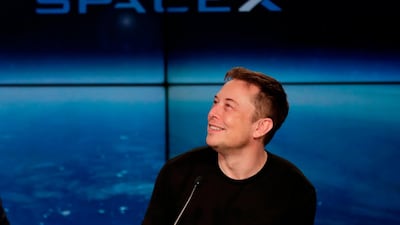One of the first TV producers I ever worked with offered work advice which stuck with me over the years.
“Don’t go to the office unless you absolutely have to,” she said. “Because offices are where creative ideas go to die."
I pointed out that we were sitting in a large office full of very creative TV producers, directors, and reporters.
“Ah, yes,” she said. “People do come to the office. But we come to socialise. All the really useful work is done outside.”
She had a point. The essence of a creative business involves getting out and meeting customers, suppliers and others, while maintaining a good team spirit in the office. But there is evidence that offices – which is where most of us now work – are not very creative places. If you have ever seen the American comic strip Dilbert, you will know what I mean. It involves an office worker's desperate attempts to outwit the stupidities of his bosses.
Now one boss, Elon Musk, the chief executive of Tesla and SpaceX, appears to side with Dilbert and is trying to make his offices more creative. Mr Musk is a serial entrepreneur producing the sleek Tesla electric sports car and at SpaceX, the prototype for a spacecraft to take humans to Mars. He also talks of a hyperloop train so fast, it could break the sound barrier. He is, in other words, a dreamer – but Mr Musk dreams while being clear about the realities of what new technologies can achieve.
I met him when he launched his sports car in Europe and he was, as you might expect, engaging, brash, full of ideas, optimistic and a great salesman. But now, in an internal email obtained by the tech website Elektrek, Mr Musk talks about how his company can move forward with the new Model 3 Tesla car by avoiding “excessive meetings”, which, he says “are the blight of big companies and almost always get worse over time”.
These are words which any of us who have spent our lives as office drones will read and cheer. Mr Musk instructs his staff to avoid all large meetings “unless you’re certain they are providing value to the whole audience, in which case keep them very short. Also get rid of frequent meetings, unless you are dealing with an extremely urgent matter”. Even better, Mr Musk suggests office workers should just leave meetings when they become boring. Doing so is not rude because “it is rude to make someone stay and waste their time”.
All around the world Dilberts will be cheering. And while no one can be sure whether Mr Musk will ever invent a new way to live on Mars, if he can re-invent worldwide office culture he deserves some kind of award. My own rule has been that any large meeting (that is, of more than four people) is unlikely to achieve anything whatsoever unless it is very short, preferably 20 minutes or less. Those of us who have worked in great bureaucracies will understand that some of our fellow workers (usually male) talk the talk – that is, they rehearse a fancy speech, which they deliver with panache but which takes up a great deal of time and often has little to do with real work. Meetings like this tend to result in nothing more than a decision not to decide anything, except to hold another meeting the following week.
_____________________
Read more from Gavin Esler:
Who would want to join politics when it is so riven with nasty factions?
The Good Friday Agreement teaches us important lessons
Blade Runner and the dystopian vision that missed our changing social habits
_____________________
One solution to dreary office culture is to have a leader like Mr Musk who actually leads and tells his staff to walk out of boring meetings. A more polite solution is never – ever – to allow people to sit down for a meeting. Meetings where everyone stands are always short. The Danish TV series Borgen is a good example. It told the story of politics at the highest level in Denmark and it was a riveting piece of work.
But beyond the script and the acting, I was fascinated to see that all meetings in the fictional TV newsroom in Borgen were conducted while standing around a raised desk. No one could slump in a corner and no one talked too much.
One other improvement comes from a friend of mine who leads the team in a high quality and high-pressure magazine. She does not believe in long and boring meetings but she does believe that offices can be creative, provided that people actually do talk to each other in small groups or, even better, one-to-one. She has banned the sending of most internal emails, insisting that office staff actually get up from their desks and talk to each other. This is not a contradiction of the Mr Musk method. It is a recognition that team building and socialising are important but being hectored in large numbers from a platform by a boring boss who seems to enjoy the sound of his own voice truly is a creativity killer. Office workers of the world unite; we have nothing to lose but the tedium of long meetings.
Gavin Esler is a television presenter, author and journalist


